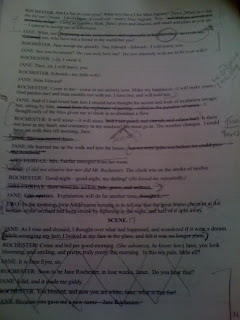Four.
(Or Reflections)
This post is about my production of Jane Eyre. Reflections, really.
I first thought about adapting Jane Eyre when I was 16, in a (wait for it) adapting literature for the stage after school drama class. I "adapted" about three pages of it and thought it worked quite well. And then I promptly forgot all about adapting Jane Eyre for about ten years. Then last year, having finished working on my production of Romeo & Juliet, inspiration struck. Jane Eyre. A new adaptation. Why not?
.JPG) | |
| cover page of my script, complete with requisite coffee stains |
My adaptation, as oppose to some of the other adaptations I read, contained only words from the book. Granted I switched the order of some things and edited til I hardly recognized some things, but every word was -- is -- Bronte's. In my mind, what is the point of adapting a book, if you don't use the language already there? Its all there. Every word, every emotion, every place setting, every detail is there.
And that is something I discovered in the rehearsal process: I didn't always miss text I'd cut, but oftentimes there were moments that I'd had to cut from the book (for reasons of pace, continuity, placement, action) that I so missed. And speaking of cutting things, my goal was to get to rehearsal with a script that was 70 pages long,
 |
| see all the cutting? |
One point I do want to make is that this script wasn't work-shopped. I did not have the time or the funds to do proper research and development on it. I had three weeks of rehearsal to put together a production and that is what we did. So to come out the other side of it with the product that we did is a testament to everyone involved, cast, crew, producers, interns, designers, and a very, very generous audience who were up for seeing something slightly different.
So that was the script. For me, the design was always very clear. Because the adaptation was all about the book and the text, that is what I wanted to present. So a parchment coloured space. With accents of brown, black. Simple. No props. Just a few books. Actors onstage the whole time. Reading and bearing witness. Creating space with bodies, chairs, and very clear "geography" onstage. I find that as I'm planning a production, I see it in my head. Of course these things change and become more and less clear and as soon as you put words in actors mouths things change. When you put clothes on them, they change. And when you ask them to do things, they change. But in a very strange way, the production that came about, was very close to the production I saw in my head. Which is an amazing thing.
And on to the directing bit. Which I can't really write about properly because I can't tell you what I do or don't do. The directing is a bit like trying to be both the smartest audience member ever and also
Finally, this is about letting it go. I found that I didn't have to or want to watch every performance. I watched most of them, I'm not going to lie, but not every one (massive departure from R&J, when I did watch every performance, then operated most of them and when the opportunity arose to not be there for a performance I had to take myself out of London so that I wouldn't be tempted to sneak in and watch how it was going).
I do theatre because I love it. I do theatre because I think I understand how it should work. I do theatre because I know how to tell stories and I quite like telling stories. The difficult thing about theatre is making something that is so ephemeral have a lasting impression. And striving for that is probably why I do what I do.